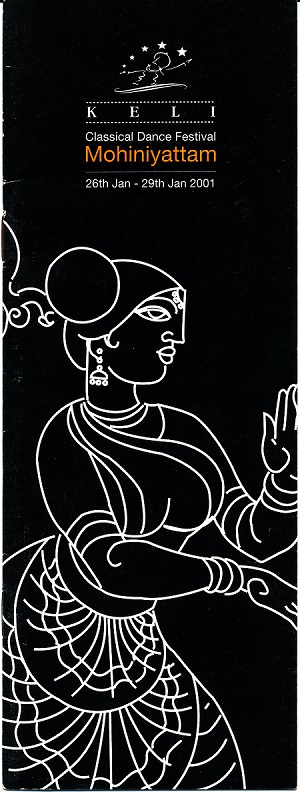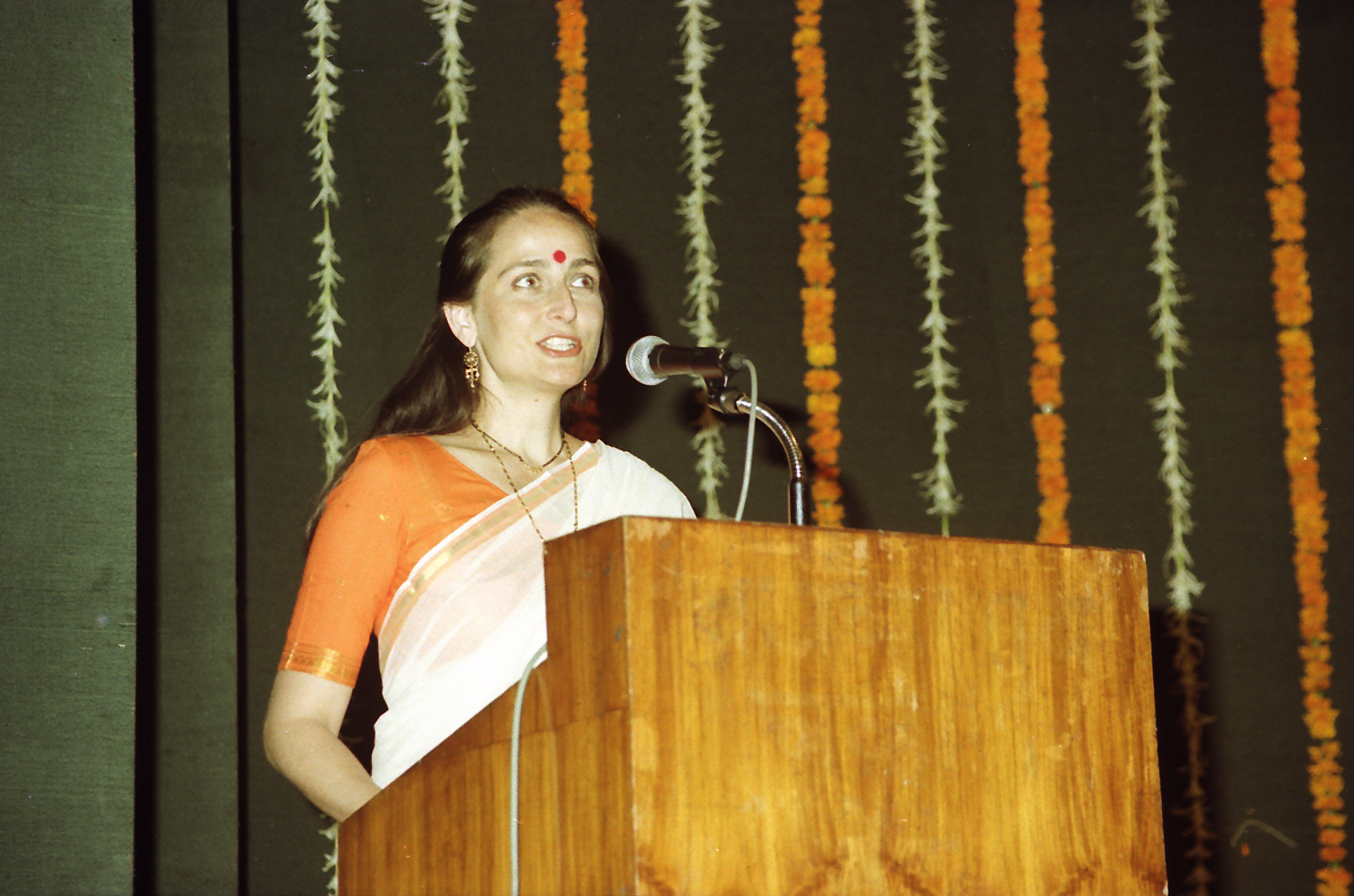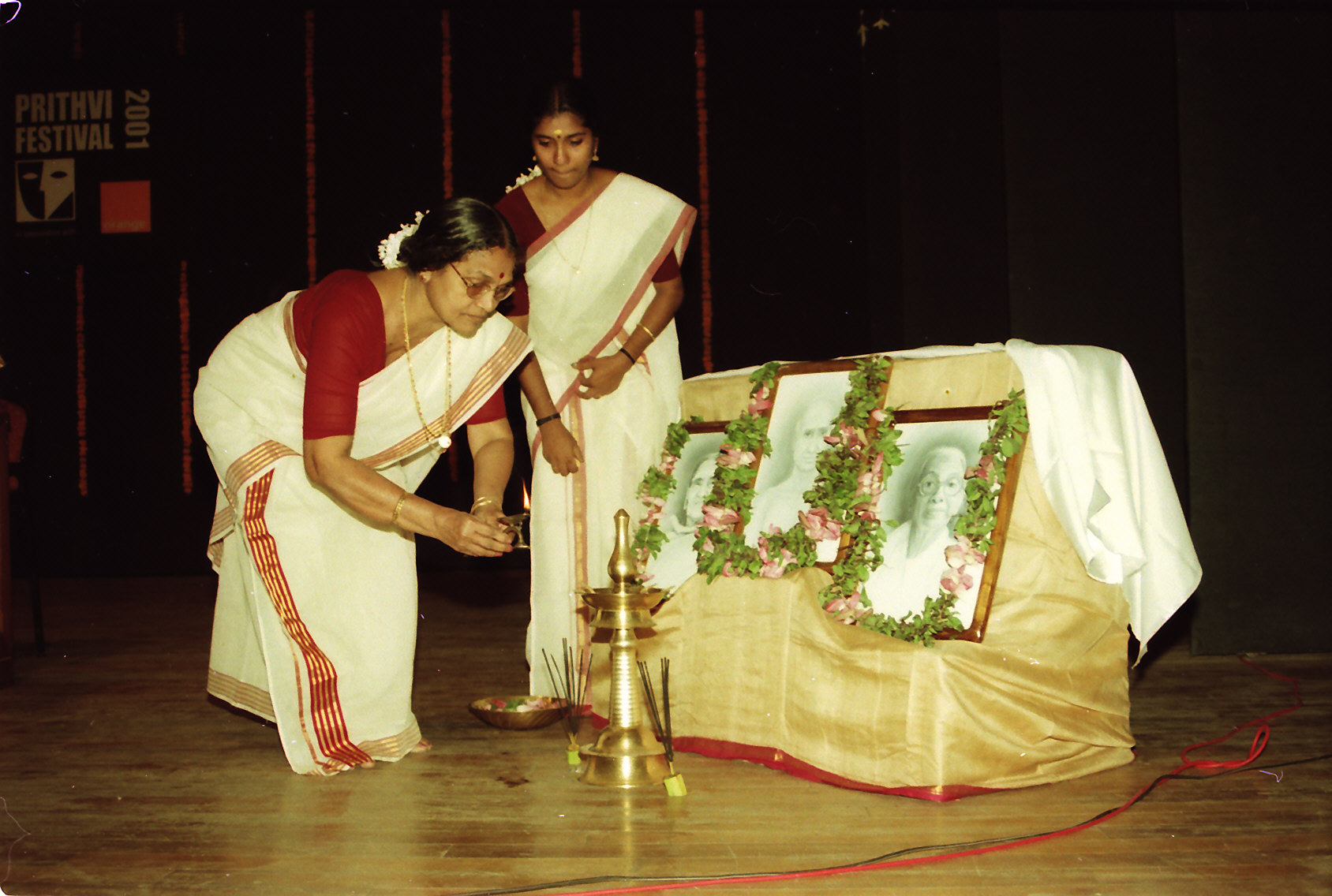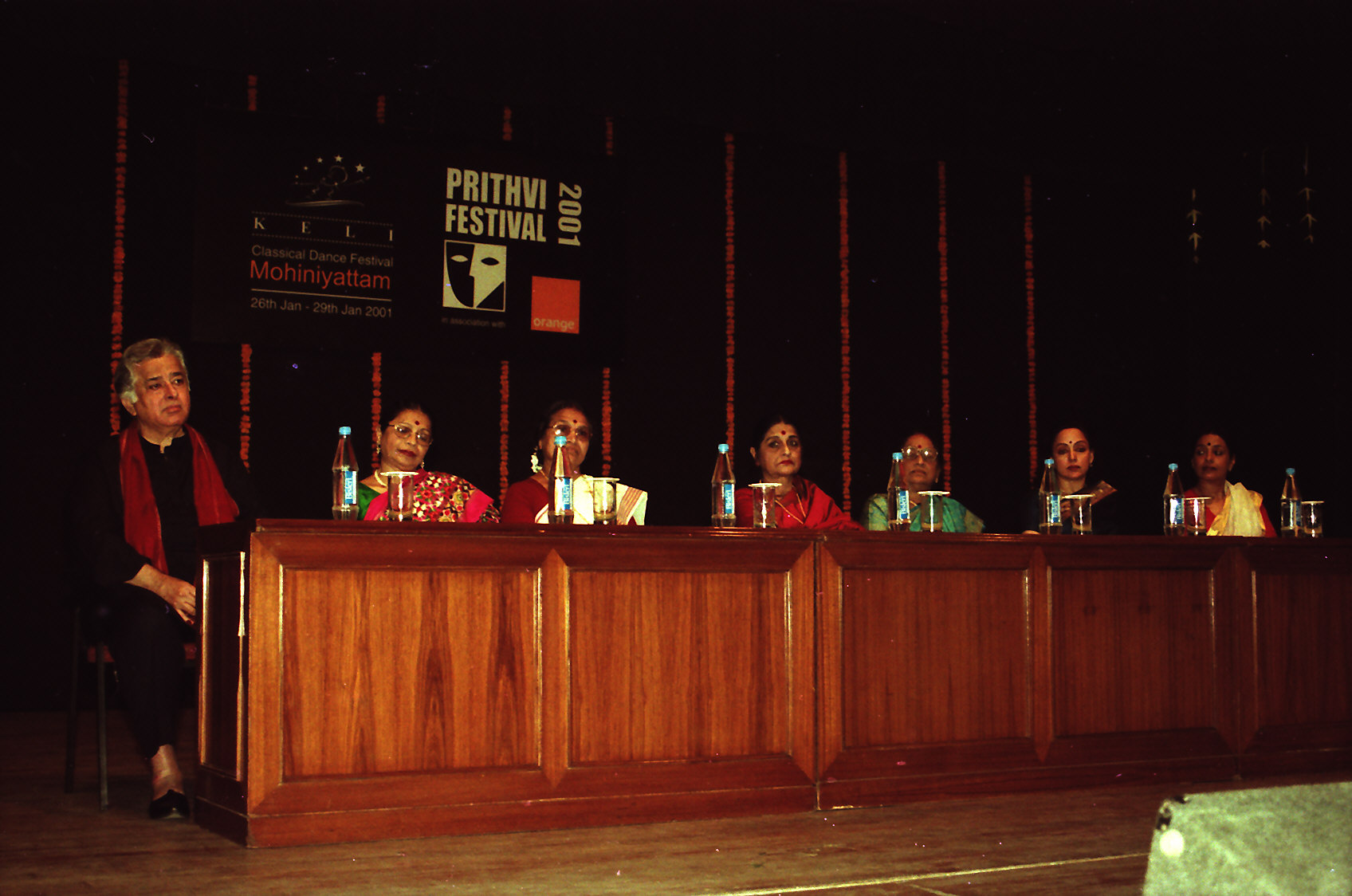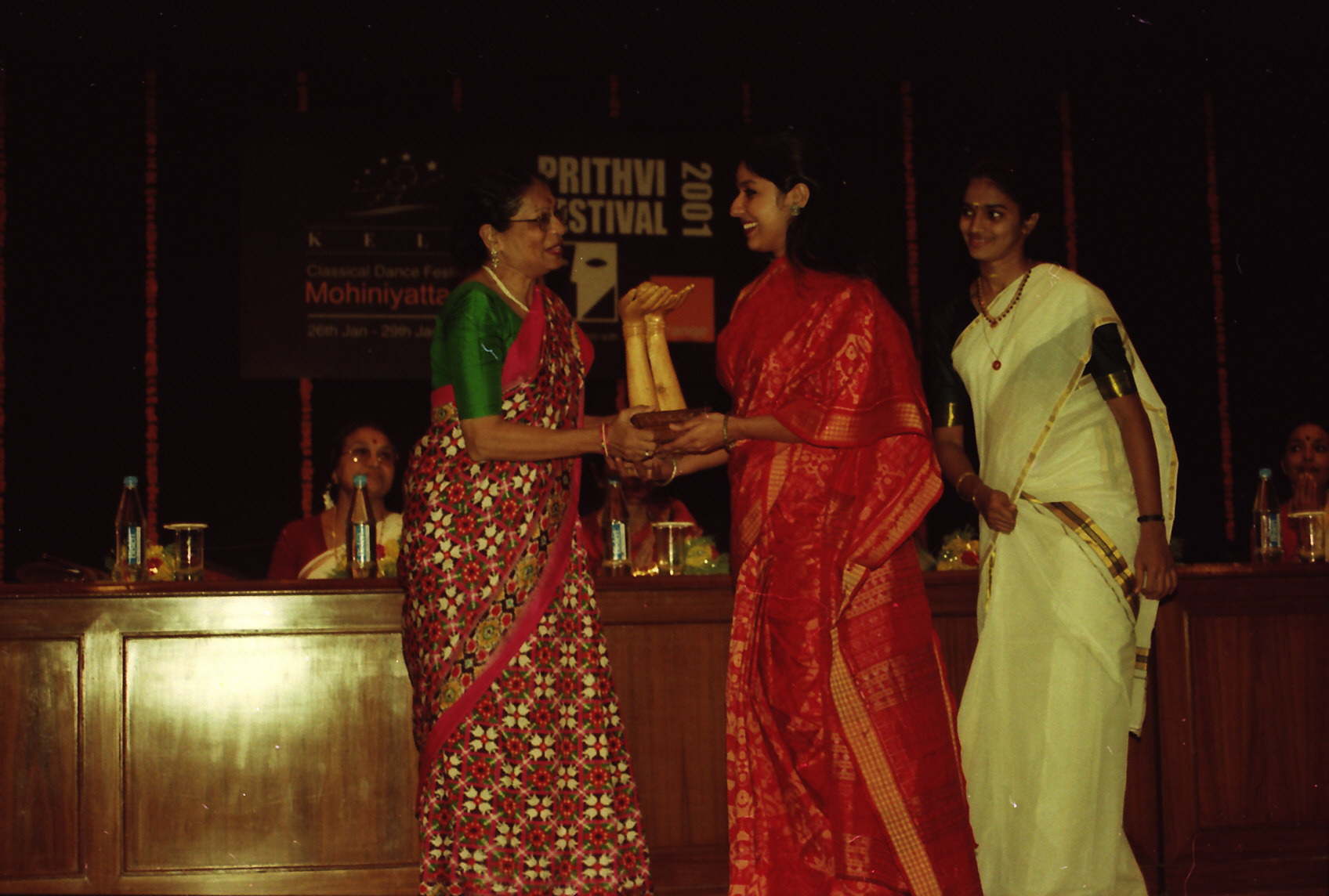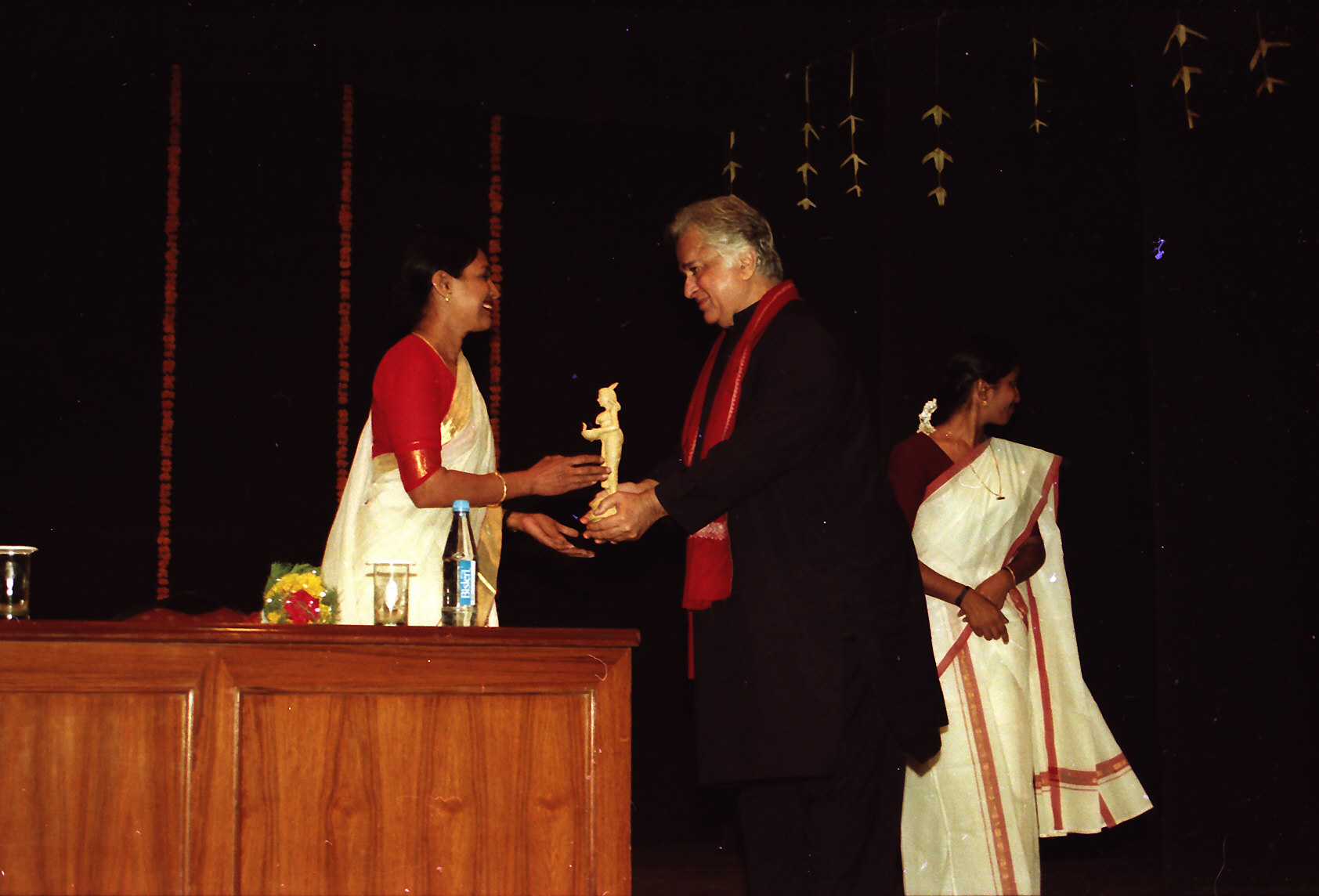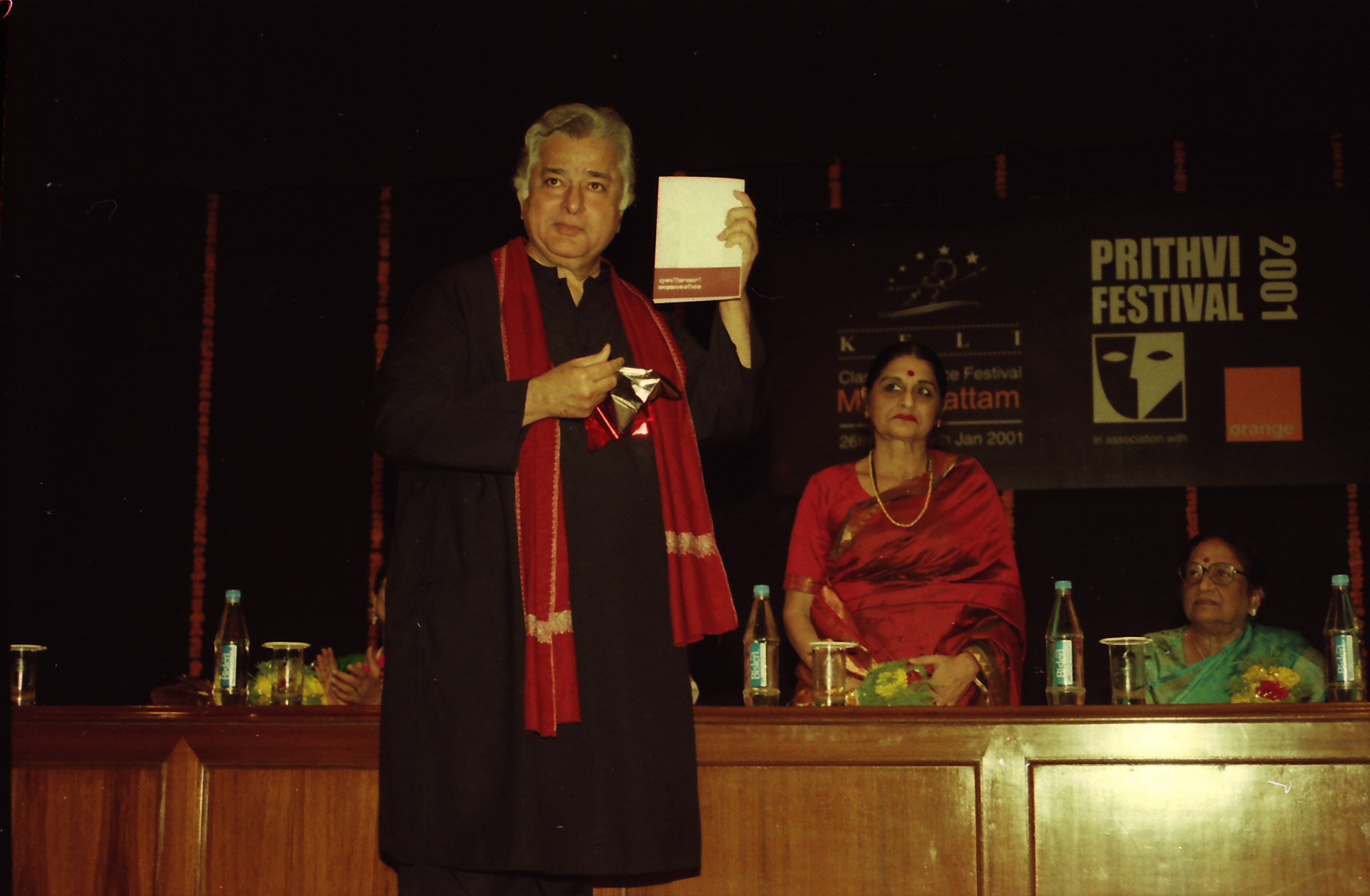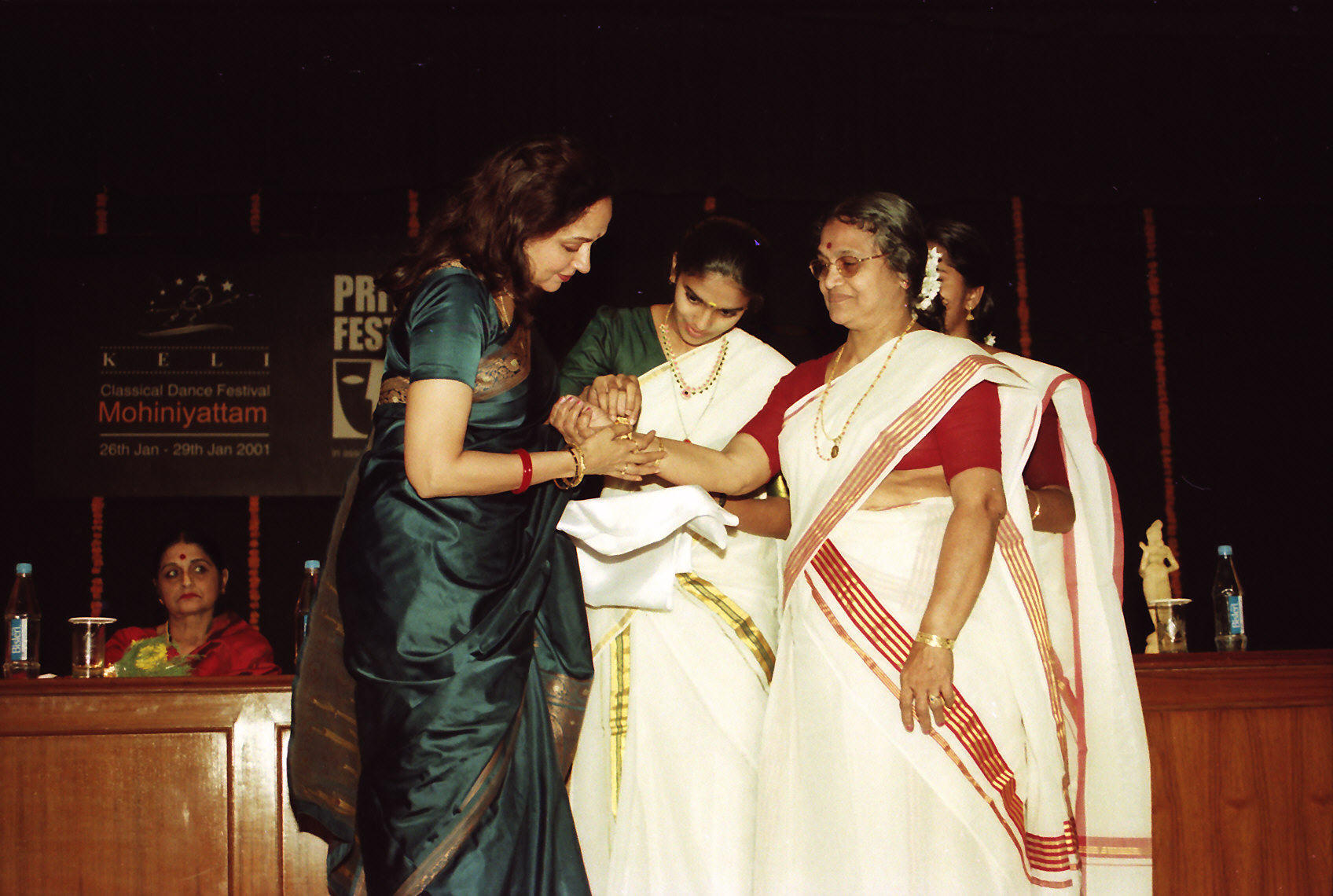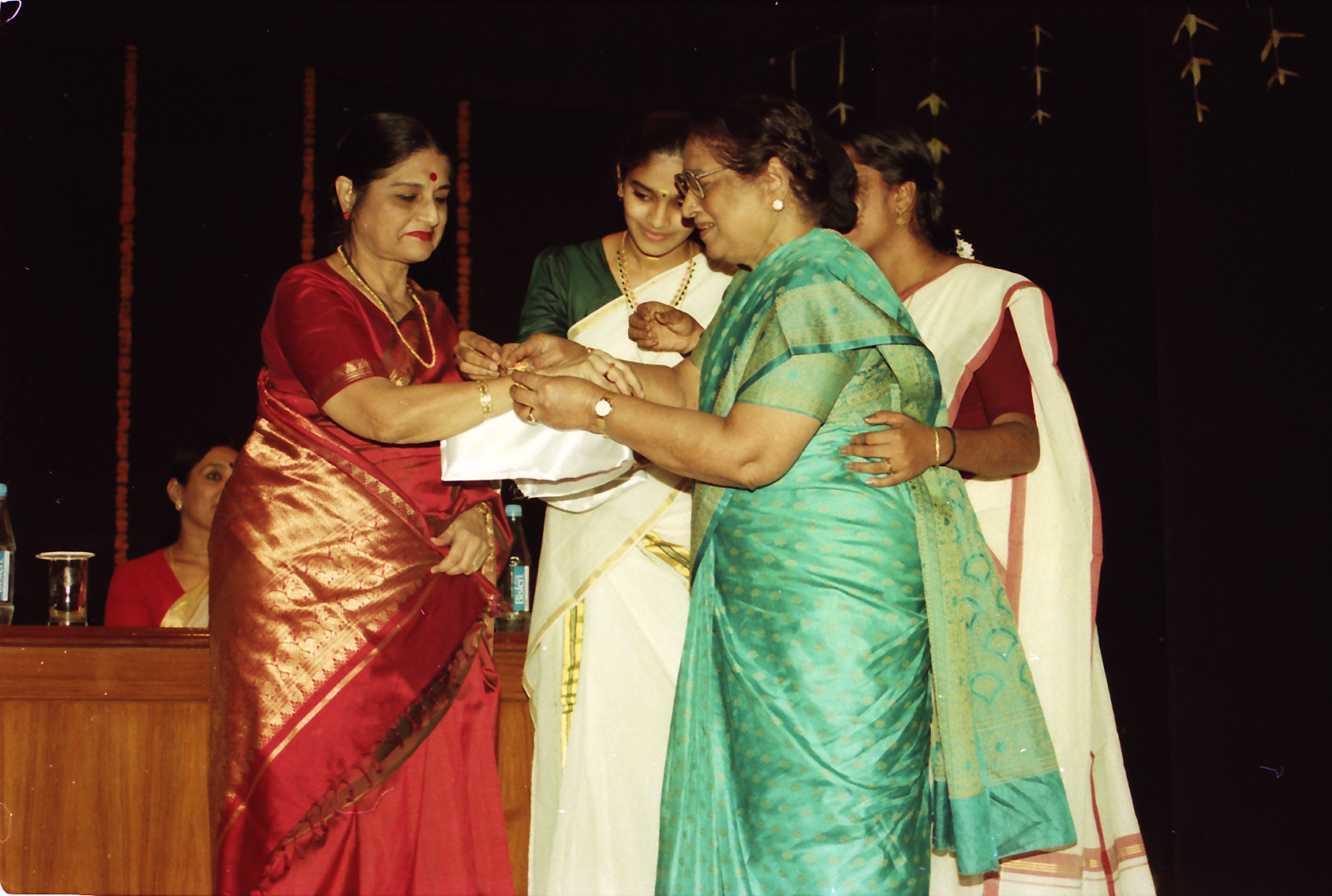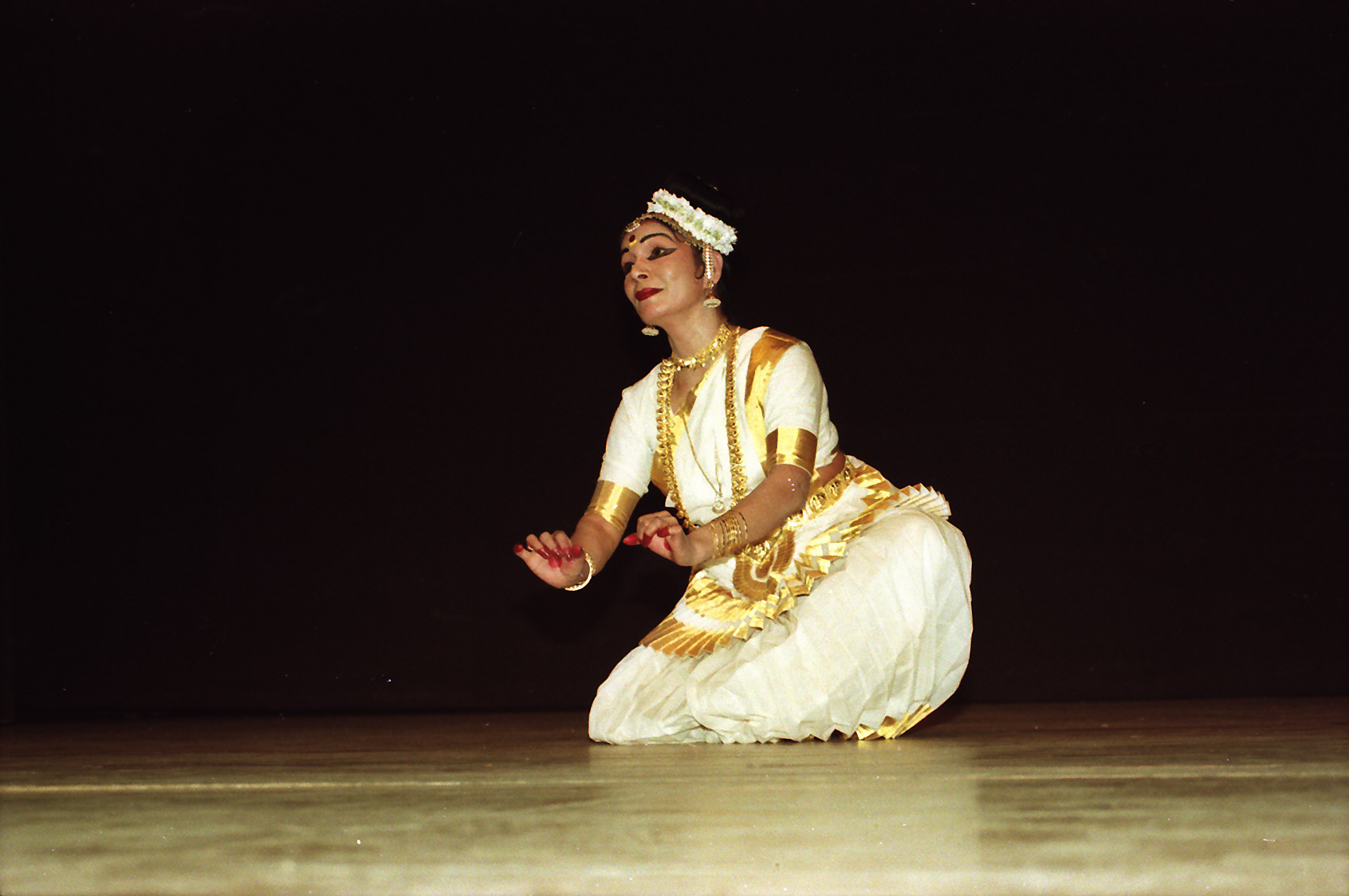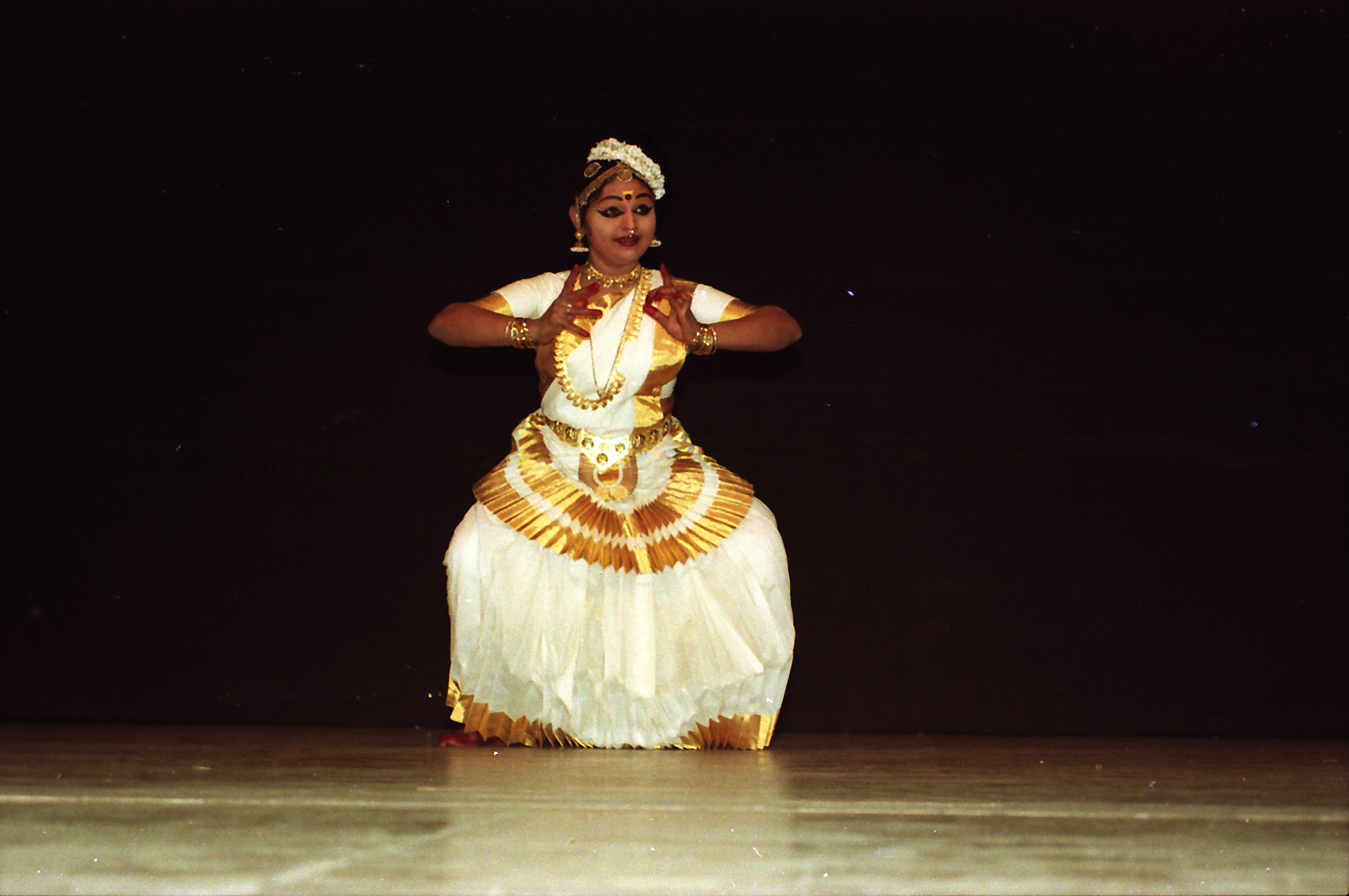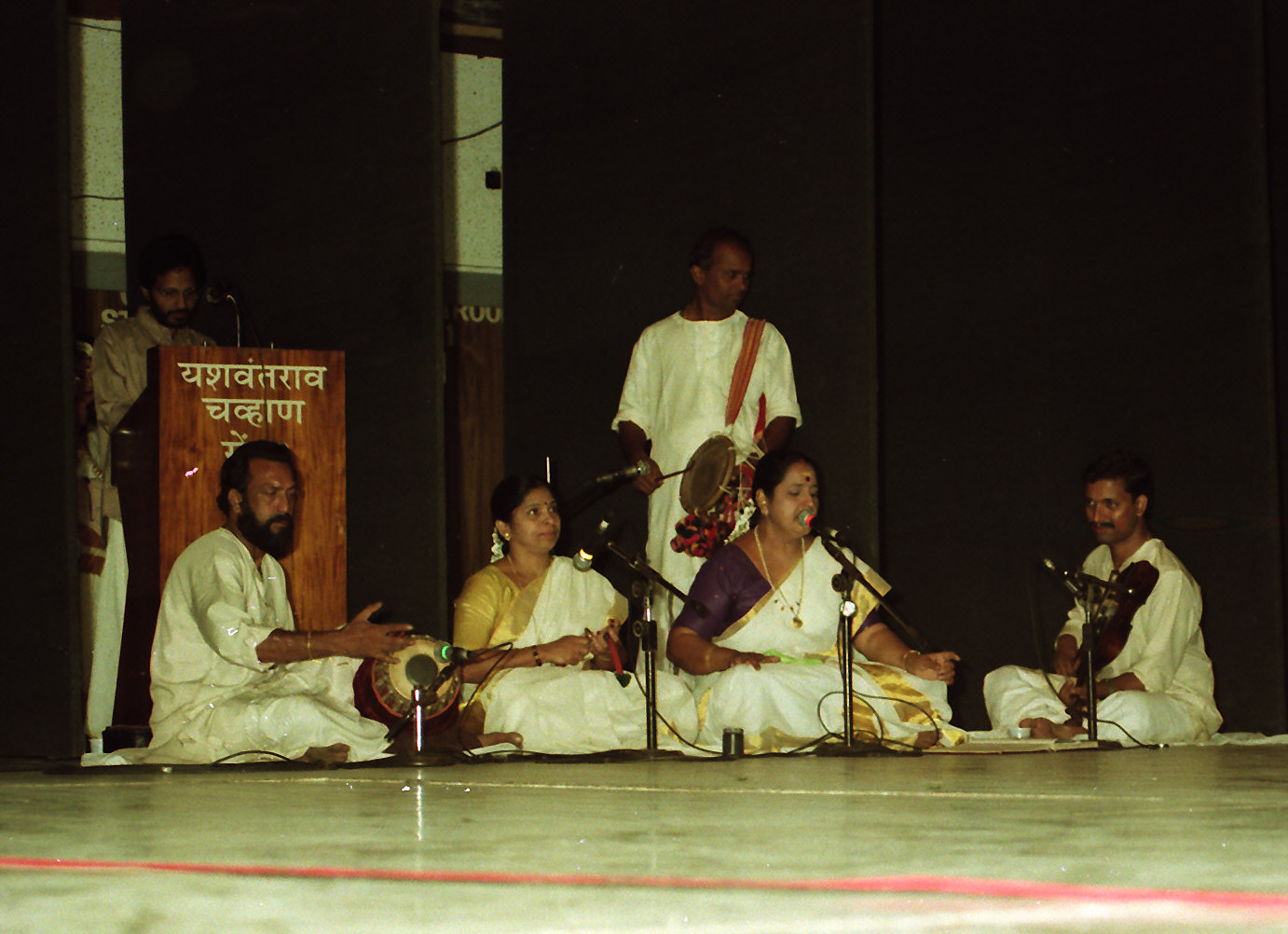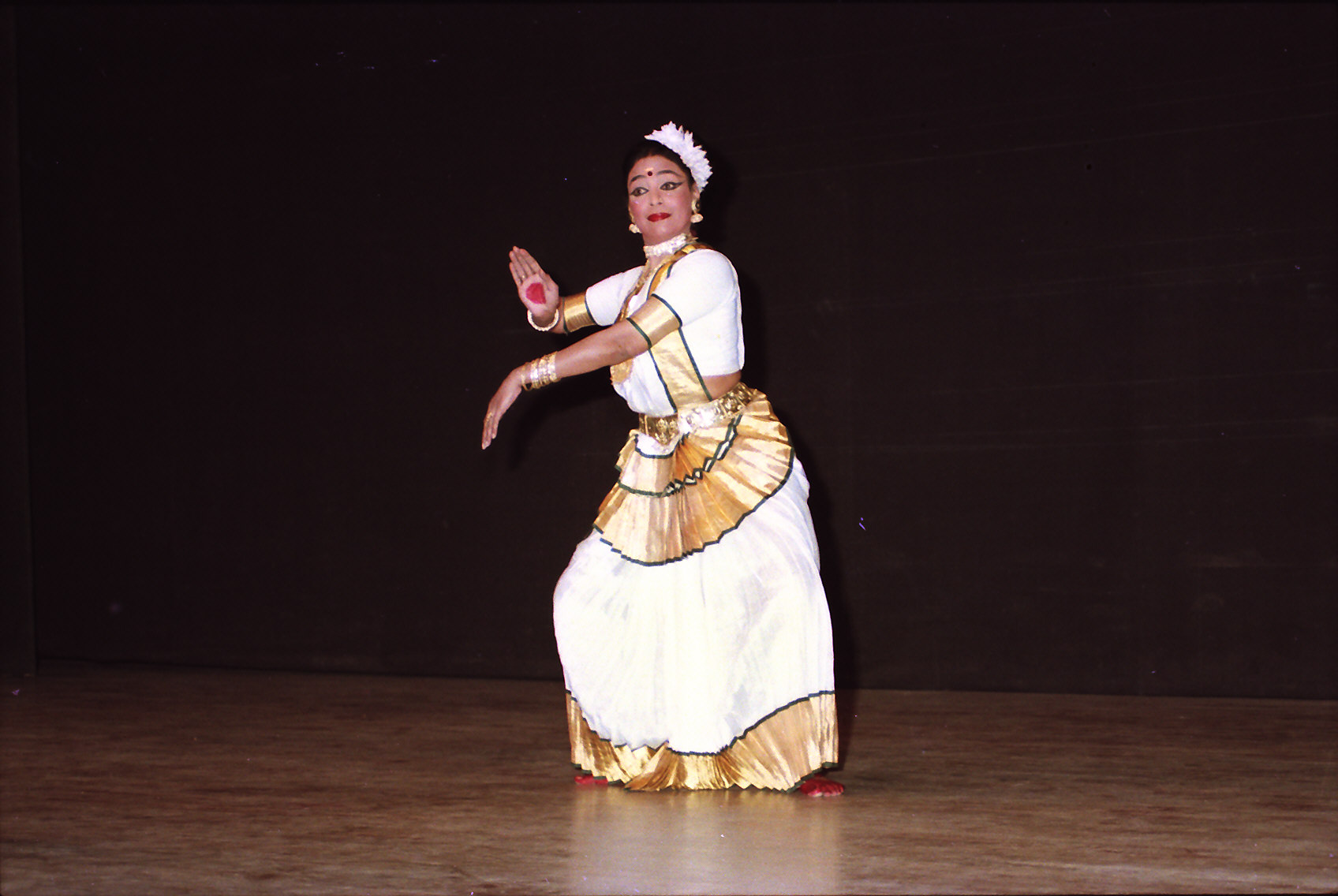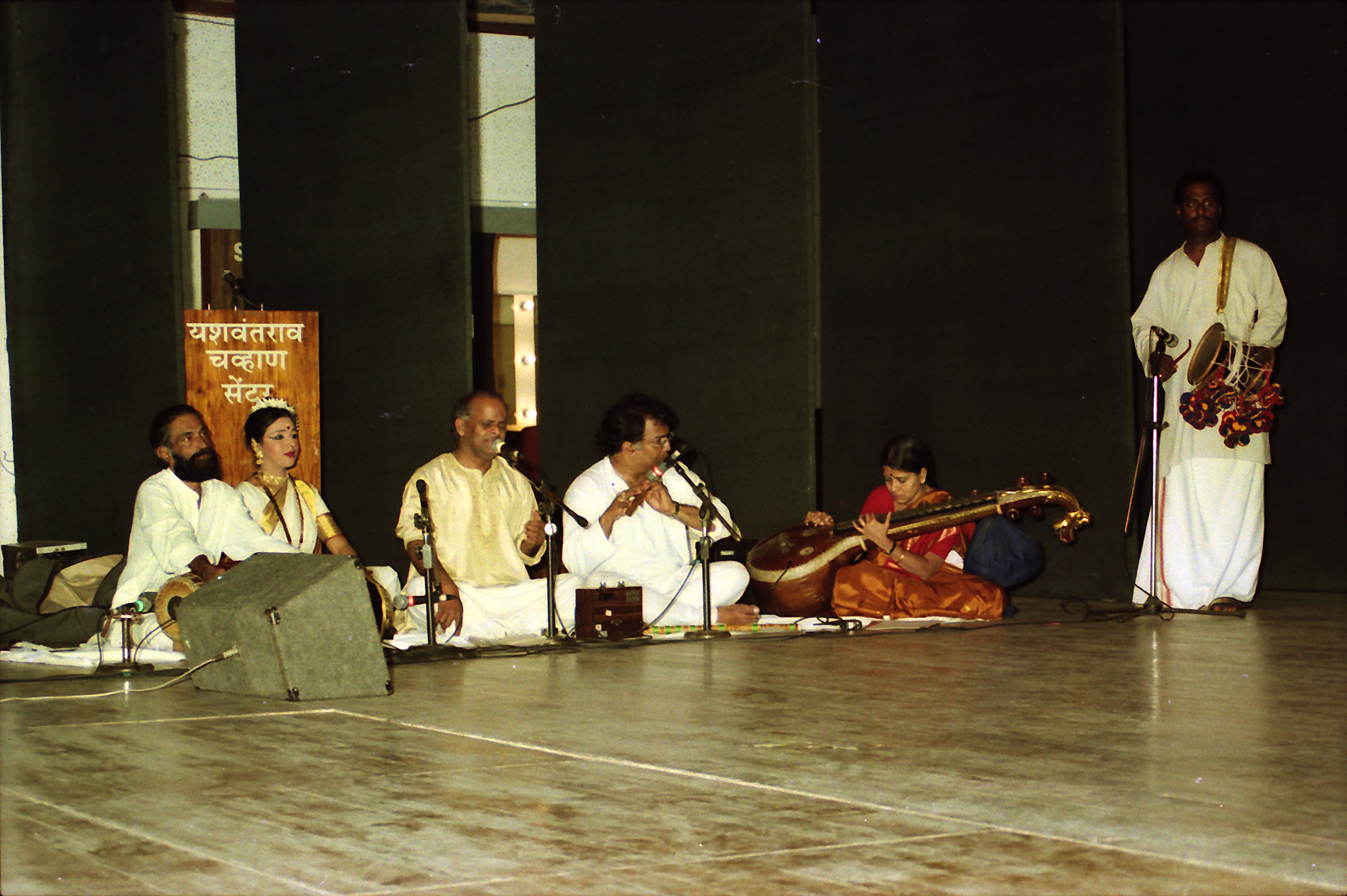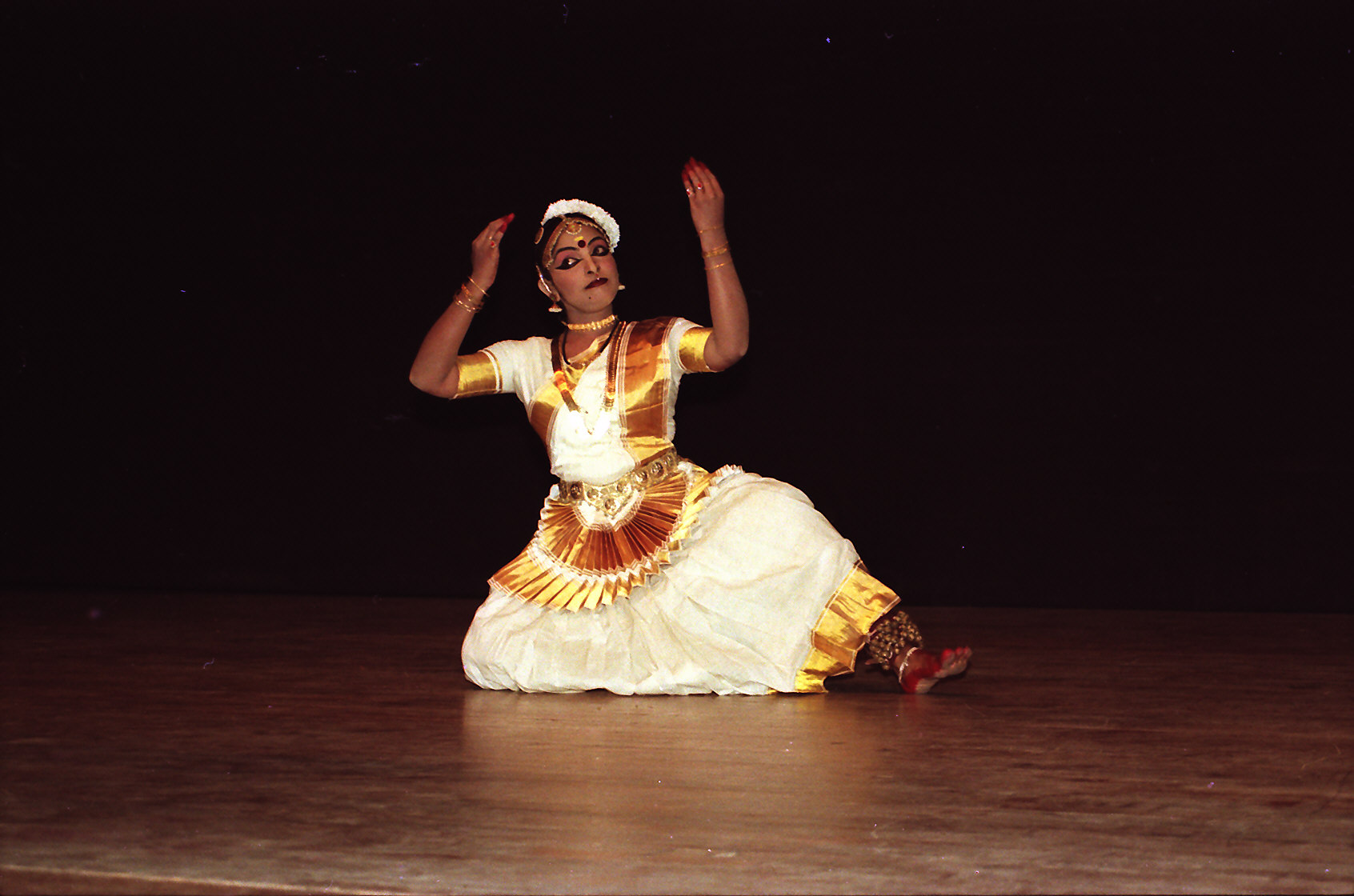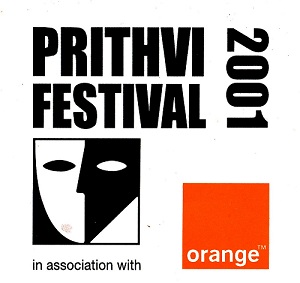
Presents

Classical Dance Festival
Mohiniyattam
26th Jan - 29th Jan 2001
Dear Art Lovers,
This four-day Mohiniyattam festival featuring some of the leading performers and teachers of this ancient Kerala tradition is being organised in Mumbai during 26,27,28,29, Jan 2001. The festival will also include a two-day seminar on Mohiniyattam in which the many aspects of this dance tradition will be discussed by scholars and leading exponents. The festival is being organised by Keli and Prithvi Festival in association with Orange.
Mohiniyattam, literally the dance of the enchantress, is one of the most lyrical of Indian dance traditions. It is a solo dance form of Kerala exclusively performed by women with a predominant emphasis on lasya elements of dance. At its best, Mohiniyattam perfectly blends the sensuous with the sublime and therefore appeals directly to the heart. It has certain unique characteristics particularly in relation to body movements, which are entirely different from other dance styles. The Sopana style of singing give much colour and vitality to this style of dance. Mohiniyattam tradition has a long history. Literary works of Sixteenth century have references to this dance form. It was during the reign of Karthika Thirunal Balaramavarma of Travancore (author of the great treatise on dramaturgy Balaramabharatham) and his successor and nephew Maharaja Swathi Thirunal, the term Mohiniyattam came to be applied to this exquisite ancient dance form. They made substantial contributions towards encouraging and stabilising this art form. By the beginning of the 20th Century it suffered a tremendous set back. In 1930 Mahakavi Vallathol and his friend Mukunda Raja instituted Kerala Kalamandalam and included Mohiniyattam as a faculty in this institution. Guru Nattuvan Korattikkara Appuredath Krishna Panicker and his disciples Chinnammu Amma and Kalyanikutty Amma played significant roles in reviving and rejuvenating Mohiniyattam and passing it on to succeeding generations in its traditional forms. Their contributions in this respect ought to be remembered with utmost reverence, gratitude and thankfulness. Later there have been serious efforts by dancers and scholars to delve deeply into the roots of this tradition in order to enrich its scope and sweep. New experiments at choreographing suitable poetic works in different languages in the Mohiniyattam style have also been undertaken by well-known exponents. lt continues to shine as an epitome of extreme grace, good taste, dignity and above all high cultural values..
During the festival two very senior and respected artistes who have made invaluable contributions to the preservation, growth, development and propagation of Mohiniyattam over the past many decades will be honoured and felicitated. They are Prof. Kalamandalam Sathyabhama and Dr. (Mrs.) Kanak Rele. They will be honoured with a Suvarna Kankanam (traditional golden bangle of appreciation) each as a mark of recognition of their life—time contribution to Mohiniyattam. The annual Keli Award for the Most Promising Mohiniyattam Artiste of the year 2000 will also be presented during the festival. The entire festival is dedicated to the memory of Late Guru Nattuvan Korattikkara Krishna Panicker and his disciples Late Chinnammu Amma and Kalyanikutty Amma.
Prithvi theatre, a dream project of Jennifer and Shashi Kapoor was established in 1978. After enduring a period of struggle and agony in its initial days the theatre moved into the forefront of theatrical activities in the city. It is today a rendezvous of budding as well as professional dramatists. And most recently it is also the proud presenter of festivals like Theatre of India 97, Theatre of Europe 98, Theatre of Mumbai 99 and Setting the Stage 2000.
Keli is a Mumbai based organisation dedicated to bringing art lovers in contact with traditional and classical art forms. ln the past it has handled some very exclusive projects such as the Kathakali Festival of Kottayam Stories in 1997, the Classical Womens Theatre Festival in 1998, Swathi Thirunal Music Festival in 1999 and the Classical Rhythm Festival in 1999. Orange believes in the appreciation of varied, cultures and respect for our heritage. It is with, this conviction to support the performing arts that Orange has b een associated with Prithvi since 1997. Orange is once again privileged to bring to you the Mohiniyattam classical dance festival organised by Keli and Prithvi Theatre.
We cordially invite all art lovers of Mumbai to share the joy and excitement of this unique festival of dance.
Thanking you,
Sanjna Kapoor, Festival Director
K. Subhaschandran, Artistic Director & Project Co- ordinator
Ramachandran, Secretary, Keli
Day 1
Friday, 26 February 2001
Seminar on Mohiniyattam
at Prithvi Theatre, Juhu, 9.30 am
Subject:
Aesthetics of Mohiniyattam by Bharati Shivaji
Individuality of Mohiniyattam by Kalamandalkam Leelamma
Opening Ceremony
At Y B Chavan Centre, 6.45 pm
Welcome Speech: Sanjana Kapoor
Dedication:
Dedicating the festival towards the memory of Late Guru Nattuvan Krishna Panioker, Chinnammu Amma and Kalyanikutty Amma.
Felicitation:
Presenting the Keli Promising Artiste of the year 2000 Award to Smt. Vijayalakshmi.
Felicitating the Senior dancers Kal. Leelamma, Karl.Haimavathi, Bharathi Shivaji and Kal. Sreekala.
Rlelease of the book compiling the academic contributions of Ten senior most Gurus of Classical Art forms.
Presenting Suvarna Kankanam to Dr. Kanak Rele and Smt. Kal. Sathyabhama.
Guests of Honour:
Hema Malini, Sitara Devi , Darshana Jhaveri and Shashi Kapoor
Gurupooja (Mohiniyattam Recital)
by Kerala Kalamandalam
Kerala Kalamandalam is the inheritor of the style of Mohiniyattam originally practised and taught by Guru Nattuvan Korattikkara Appuredath Krishna Panicker who passed it on to his disciples Chinnammu Amma and Kalyani Kutty Amma. Today Kalamandalam imparts training, practices and performs Mohiniyattam in its purest form. Kal. Leelamma and Kal. Haimavathi belongs to the third generation in the line of disciples of Guru Krishna Panicker. Their style of presentation depicts how Mohiniyattam remains unadulterated, in a well defined base preservingthe spirit of aesthetics in the midst of turbulence and transformation during the last many decades. The opening performance, this evening will be by the Kalamandalam troupe led by Leelamma and Haimavathi.
Day 2
Saturday, 27 February 2001
Seminar on Mohiniyattam
at Prithvi Theatre, Juhu, 9.30 am
Subject:
Grammer & Methodology of Mohiniyattam by Padmasree Dr. (Mrs.) Kanak Rele
History and Development of Mohiniyattam through Kerala Kalamandalam by Kalamandalam Sathyabhama
Film show on Mohiniyattam
at Prithvi Theatre, Juhu
Lasyapooja (Mohiniyattam Recital)
by Bharati Shivaji and group
At Y B Chavan Centre, 6.45 pm
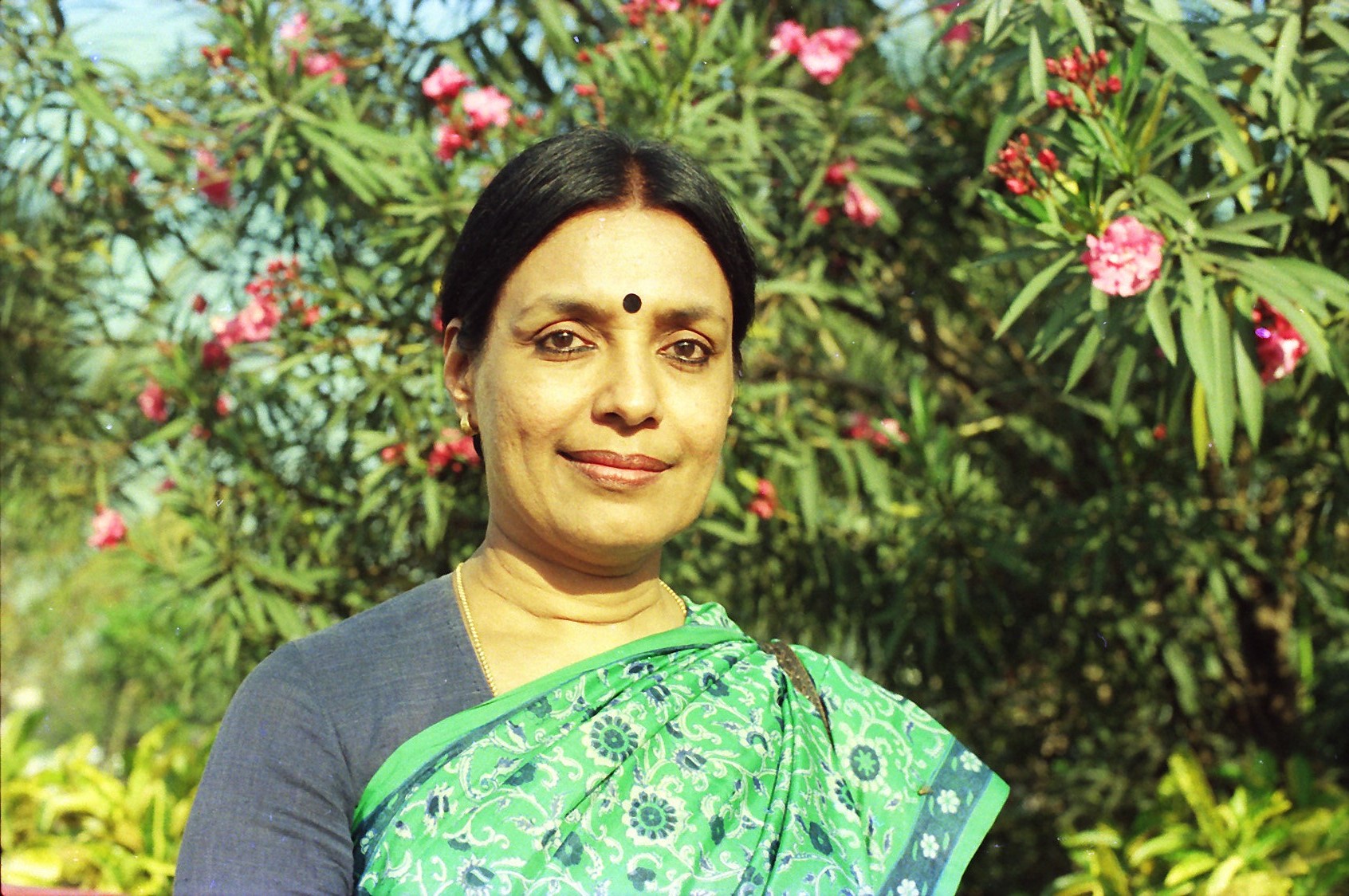
A senior disciple of M Radha Marar, Bharati Shivaji is an artiste endowed with a high degree of creativity and imaginative flair who has given serious thought and attention to. the aesthetics of Mohiniyattam. She has initiated a new style of choreography without ever violating the purity of the tradition She is one of those artistes from outside Kerala who took Mohiniyattam to the centrestage of Indian Classical dances. Smt. Bharathi Shivaji is a recipient of the
Sangeet Natak Academy Award 2000 a senior exponent with international recognition, a much sought after dancer and winner of several awards and honours.
Day 3
Sunday, 28 February 2001,
at At Y B Chavan Centre, 6.45 pm
Sargapooja (Mohiniyattam Recital)
by Kalamandalam Sreekala & Group
This performance explores the musical world of Maharaja Swathi Thirunal and the distinguished poet lrayimman Thampi in relation to Mohiniyattam. Maharaja Swathi Thirunal Rama Varma (1813 - 1846) was a great patron of all arts and as a composer, is rated equal to the great trinity of Karnatik music. The innumerable Varnams, Krithis, Keerthanam and Padams of Swathi Thirunal‘, some of which were specially composed for Mohiniyattam are great favourites of dancers even today. lrayimman Thampi, scholar, Poet and exponent of classical art forms was the
author of several musical pieces, even attakathas (poetic texts for Kathakali) apart from other outstanding literary works. In this evening's performance, exclusively devoted to Swathi Thirunal and lrayimman Thampi, Sreekala and her group explore the relevance of these two composers to the Mohiniyattam tradition.
Day 4
Monday, 29 February 2001,
at At Y B Chavan Centre, 6.45 pm
Sakthipooja (Mohiniyattam Recital)
by Padmasree Dr. (Mrs.) Kanak Rele & Group
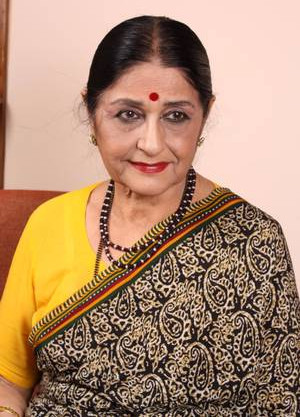
Dr. Mrs. Kanak Rele believes that Mohiniyattam was never a dance of the enchantress but a dance of transformation representing the female energy in dance. One of the most distinguished dance scholars of lndia,
today Kanak's name has rightly became synonyms with Mohiniyattam and her contribution to dance academics has been substantial. Her theory of body kinetics dance notation and the teaching methodology developed by her name won her universal acclaim. She has also created solo Mohiniyattam items on Women's causes with characters like Kunthi, Draupadi, Yashodhara, Urmila etc.
Our Sincere Thanks to:
Hema Malini, Sitara Devi, Darshna Jhaveri, Kalakaumadi, Radhakrishnan, Satheesh Kumar, Kohinoor Printers Pvt. Ltd, All Artistes & Y.B. Chavan Centre.

Classical Dance Festival
Mohiniyattam
26th Jan - 29th Jan 2001
Dear Art Lovers,
This four-day Mohiniyattam festival featuring some of the leading performers and teachers of this ancient Kerala tradition is being organised in Mumbai during 26,27,28,29, Jan 2001. The festival will also include a two-day seminar on Mohiniyattam in which the many aspects of this dance tradition will be discussed by scholars and leading exponents. The festival is being organised by Keli and Prithvi Festival in association with Orange.
Mohiniyattam, literally the dance of the enchantress, is one of the most lyrical of Indian dance traditions. It is a solo dance form of Kerala exclusively performed by women with a predominant emphasis on lasya elements of dance. At its best, Mohiniyattam perfectly blends the sensuous with the sublime and therefore appeals directly to the heart. It has certain unique characteristics particularly in relation to body movements, which are entirely different from other dance styles. The Sopana style of singing give much colour and vitality to this style of dance. Mohiniyattam tradition has a long history. Literary works of Sixteenth century have references to this dance form. It was during the reign of Karthika Thirunal Balaramavarma of Travancore (author of the great treatise on dramaturgy Balaramabharatham) and his successor and nephew Maharaja Swathi Thirunal, the term Mohiniyattam came to be applied to this exquisite ancient dance form. They made substantial contributions towards encouraging and stabilising this art form. By the beginning of the 20th Century it suffered a tremendous set back. In 1930 Mahakavi Vallathol and his friend Mukunda Raja instituted Kerala Kalamandalam and included Mohiniyattam as a faculty in this institution. Guru Nattuvan Korattikkara Appuredath Krishna Panicker and his disciples Chinnammu Amma and Kalyanikutty Amma played significant roles in reviving and rejuvenating Mohiniyattam and passing it on to succeeding generations in its traditional forms. Their contributions in this respect ought to be remembered with utmost reverence, gratitude and thankfulness. Later there have been serious efforts by dancers and scholars to delve deeply into the roots of this tradition in order to enrich its scope and sweep. New experiments at choreographing suitable poetic works in different languages in the Mohiniyattam style have also been undertaken by well-known exponents. lt continues to shine as an epitome of extreme grace, good taste, dignity and above all high cultural values..
During the festival two very senior and respected artistes who have made invaluable contributions to the preservation, growth, development and propagation of Mohiniyattam over the past many decades will be honoured and felicitated. They are Prof. Kalamandalam Sathyabhama and Dr. (Mrs.) Kanak Rele. They will be honoured with a Suvarna Kankanam (traditional golden bangle of appreciation) each as a mark of recognition of their life—time contribution to Mohiniyattam. The annual Keli Award for the Most Promising Mohiniyattam Artiste of the year 2000 will also be presented during the festival. The entire festival is dedicated to the memory of Late Guru Nattuvan Korattikkara Krishna Panicker and his disciples Late Chinnammu Amma and Kalyanikutty Amma.
Prithvi theatre, a dream project of Jennifer and Shashi Kapoor was established in 1978. After enduring a period of struggle and agony in its initial days the theatre moved into the forefront of theatrical activities in the city. It is today a rendezvous of budding as well as professional dramatists. And most recently it is also the proud presenter of festivals like Theatre of India 97, Theatre of Europe 98, Theatre of Mumbai 99 and Setting the Stage 2000.
Keli is a Mumbai based organisation dedicated to bringing art lovers in contact with traditional and classical art forms. ln the past it has handled some very exclusive projects such as the Kathakali Festival of Kottayam Stories in 1997, the Classical Womens Theatre Festival in 1998, Swathi Thirunal Music Festival in 1999 and the Classical Rhythm Festival in 1999. Orange believes in the appreciation of varied, cultures and respect for our heritage. It is with, this conviction to support the performing arts that Orange has b een associated with Prithvi since 1997. Orange is once again privileged to bring to you the Mohiniyattam classical dance festival organised by Keli and Prithvi Theatre.
We cordially invite all art lovers of Mumbai to share the joy and excitement of this unique festival of dance.
Thanking you,
Sanjna Kapoor, Festival Director
This four-day Mohiniyattam festival featuring some of the leading performers and teachers of this ancient Kerala tradition is being organised in Mumbai during 26,27,28,29, Jan 2001. The festival will also include a two-day seminar on Mohiniyattam in which the many aspects of this dance tradition will be discussed by scholars and leading exponents. The festival is being organised by Keli and Prithvi Festival in association with Orange.
Mohiniyattam, literally the dance of the enchantress, is one of the most lyrical of Indian dance traditions. It is a solo dance form of Kerala exclusively performed by women with a predominant emphasis on lasya elements of dance. At its best, Mohiniyattam perfectly blends the sensuous with the sublime and therefore appeals directly to the heart. It has certain unique characteristics particularly in relation to body movements, which are entirely different from other dance styles. The Sopana style of singing give much colour and vitality to this style of dance. Mohiniyattam tradition has a long history. Literary works of Sixteenth century have references to this dance form. It was during the reign of Karthika Thirunal Balaramavarma of Travancore (author of the great treatise on dramaturgy Balaramabharatham) and his successor and nephew Maharaja Swathi Thirunal, the term Mohiniyattam came to be applied to this exquisite ancient dance form. They made substantial contributions towards encouraging and stabilising this art form. By the beginning of the 20th Century it suffered a tremendous set back. In 1930 Mahakavi Vallathol and his friend Mukunda Raja instituted Kerala Kalamandalam and included Mohiniyattam as a faculty in this institution. Guru Nattuvan Korattikkara Appuredath Krishna Panicker and his disciples Chinnammu Amma and Kalyanikutty Amma played significant roles in reviving and rejuvenating Mohiniyattam and passing it on to succeeding generations in its traditional forms. Their contributions in this respect ought to be remembered with utmost reverence, gratitude and thankfulness. Later there have been serious efforts by dancers and scholars to delve deeply into the roots of this tradition in order to enrich its scope and sweep. New experiments at choreographing suitable poetic works in different languages in the Mohiniyattam style have also been undertaken by well-known exponents. lt continues to shine as an epitome of extreme grace, good taste, dignity and above all high cultural values..
During the festival two very senior and respected artistes who have made invaluable contributions to the preservation, growth, development and propagation of Mohiniyattam over the past many decades will be honoured and felicitated. They are Prof. Kalamandalam Sathyabhama and Dr. (Mrs.) Kanak Rele. They will be honoured with a Suvarna Kankanam (traditional golden bangle of appreciation) each as a mark of recognition of their life—time contribution to Mohiniyattam. The annual Keli Award for the Most Promising Mohiniyattam Artiste of the year 2000 will also be presented during the festival. The entire festival is dedicated to the memory of Late Guru Nattuvan Korattikkara Krishna Panicker and his disciples Late Chinnammu Amma and Kalyanikutty Amma.
Prithvi theatre, a dream project of Jennifer and Shashi Kapoor was established in 1978. After enduring a period of struggle and agony in its initial days the theatre moved into the forefront of theatrical activities in the city. It is today a rendezvous of budding as well as professional dramatists. And most recently it is also the proud presenter of festivals like Theatre of India 97, Theatre of Europe 98, Theatre of Mumbai 99 and Setting the Stage 2000.
Keli is a Mumbai based organisation dedicated to bringing art lovers in contact with traditional and classical art forms. ln the past it has handled some very exclusive projects such as the Kathakali Festival of Kottayam Stories in 1997, the Classical Womens Theatre Festival in 1998, Swathi Thirunal Music Festival in 1999 and the Classical Rhythm Festival in 1999. Orange believes in the appreciation of varied, cultures and respect for our heritage. It is with, this conviction to support the performing arts that Orange has b een associated with Prithvi since 1997. Orange is once again privileged to bring to you the Mohiniyattam classical dance festival organised by Keli and Prithvi Theatre.
We cordially invite all art lovers of Mumbai to share the joy and excitement of this unique festival of dance.
Thanking you,
Sanjna Kapoor, Festival Director
K. Subhaschandran, Artistic Director & Project Co- ordinator
Ramachandran, Secretary, Keli
Day 1
Friday, 26 February 2001
Seminar on Mohiniyattam
at Prithvi Theatre, Juhu, 9.30 amSubject:
Aesthetics of Mohiniyattam by Bharati Shivaji
Individuality of Mohiniyattam by Kalamandalkam Leelamma
Opening Ceremony
At Y B Chavan Centre, 6.45 pmWelcome Speech: Sanjana Kapoor
Dedication:
Dedicating the festival towards the memory of Late Guru Nattuvan Krishna Panioker, Chinnammu Amma and Kalyanikutty Amma.
Felicitation:
Presenting the Keli Promising Artiste of the year 2000 Award to Smt. Vijayalakshmi.
Felicitating the Senior dancers Kal. Leelamma, Karl.Haimavathi, Bharathi Shivaji and Kal. Sreekala.
Rlelease of the book compiling the academic contributions of Ten senior most Gurus of Classical Art forms.
Presenting Suvarna Kankanam to Dr. Kanak Rele and Smt. Kal. Sathyabhama.
Guests of Honour:
Hema Malini, Sitara Devi , Darshana Jhaveri and Shashi Kapoor
Gurupooja (Mohiniyattam Recital)
by Kerala KalamandalamKerala Kalamandalam is the inheritor of the style of Mohiniyattam originally practised and taught by Guru Nattuvan Korattikkara Appuredath Krishna Panicker who passed it on to his disciples Chinnammu Amma and Kalyani Kutty Amma. Today Kalamandalam imparts training, practices and performs Mohiniyattam in its purest form. Kal. Leelamma and Kal. Haimavathi belongs to the third generation in the line of disciples of Guru Krishna Panicker. Their style of presentation depicts how Mohiniyattam remains unadulterated, in a well defined base preservingthe spirit of aesthetics in the midst of turbulence and transformation during the last many decades. The opening performance, this evening will be by the Kalamandalam troupe led by Leelamma and Haimavathi.
Day 2
Saturday, 27 February 2001
Seminar on Mohiniyattam
at Prithvi Theatre, Juhu, 9.30 amSubject:
Grammer & Methodology of Mohiniyattam by Padmasree Dr. (Mrs.) Kanak Rele
History and Development of Mohiniyattam through Kerala Kalamandalam by Kalamandalam Sathyabhama
Film show on Mohiniyattam
at Prithvi Theatre, Juhu
Lasyapooja (Mohiniyattam Recital)
by Bharati Shivaji and groupAt Y B Chavan Centre, 6.45 pm
A senior disciple of M Radha Marar, Bharati Shivaji is an artiste endowed with a high degree of creativity and imaginative flair who has given serious thought and attention to. the aesthetics of Mohiniyattam. She has initiated a new style of choreography without ever violating the purity of the tradition She is one of those artistes from outside Kerala who took Mohiniyattam to the centrestage of Indian Classical dances. Smt. Bharathi Shivaji is a recipient of the Sangeet Natak Academy Award 2000 a senior exponent with international recognition, a much sought after dancer and winner of several awards and honours.
Day 3
Sunday, 28 February 2001,
at At Y B Chavan Centre, 6.45 pm
Sargapooja (Mohiniyattam Recital)
by Kalamandalam Sreekala & GroupThis performance explores the musical world of Maharaja Swathi Thirunal and the distinguished poet lrayimman Thampi in relation to Mohiniyattam. Maharaja Swathi Thirunal Rama Varma (1813 - 1846) was a great patron of all arts and as a composer, is rated equal to the great trinity of Karnatik music. The innumerable Varnams, Krithis, Keerthanam and Padams of Swathi Thirunal‘, some of which were specially composed for Mohiniyattam are great favourites of dancers even today. lrayimman Thampi, scholar, Poet and exponent of classical art forms was the author of several musical pieces, even attakathas (poetic texts for Kathakali) apart from other outstanding literary works. In this evening's performance, exclusively devoted to Swathi Thirunal and lrayimman Thampi, Sreekala and her group explore the relevance of these two composers to the Mohiniyattam tradition.
Day 4
Monday, 29 February 2001,
at At Y B Chavan Centre, 6.45 pm
Sakthipooja (Mohiniyattam Recital)
by Padmasree Dr. (Mrs.) Kanak Rele & GroupDr. Mrs. Kanak Rele believes that Mohiniyattam was never a dance of the enchantress but a dance of transformation representing the female energy in dance. One of the most distinguished dance scholars of lndia, today Kanak's name has rightly became synonyms with Mohiniyattam and her contribution to dance academics has been substantial. Her theory of body kinetics dance notation and the teaching methodology developed by her name won her universal acclaim. She has also created solo Mohiniyattam items on Women's causes with characters like Kunthi, Draupadi, Yashodhara, Urmila etc.
Our Sincere Thanks to:
Hema Malini, Sitara Devi, Darshna Jhaveri, Kalakaumadi, Radhakrishnan, Satheesh Kumar, Kohinoor Printers Pvt. Ltd, All Artistes & Y.B. Chavan Centre.




